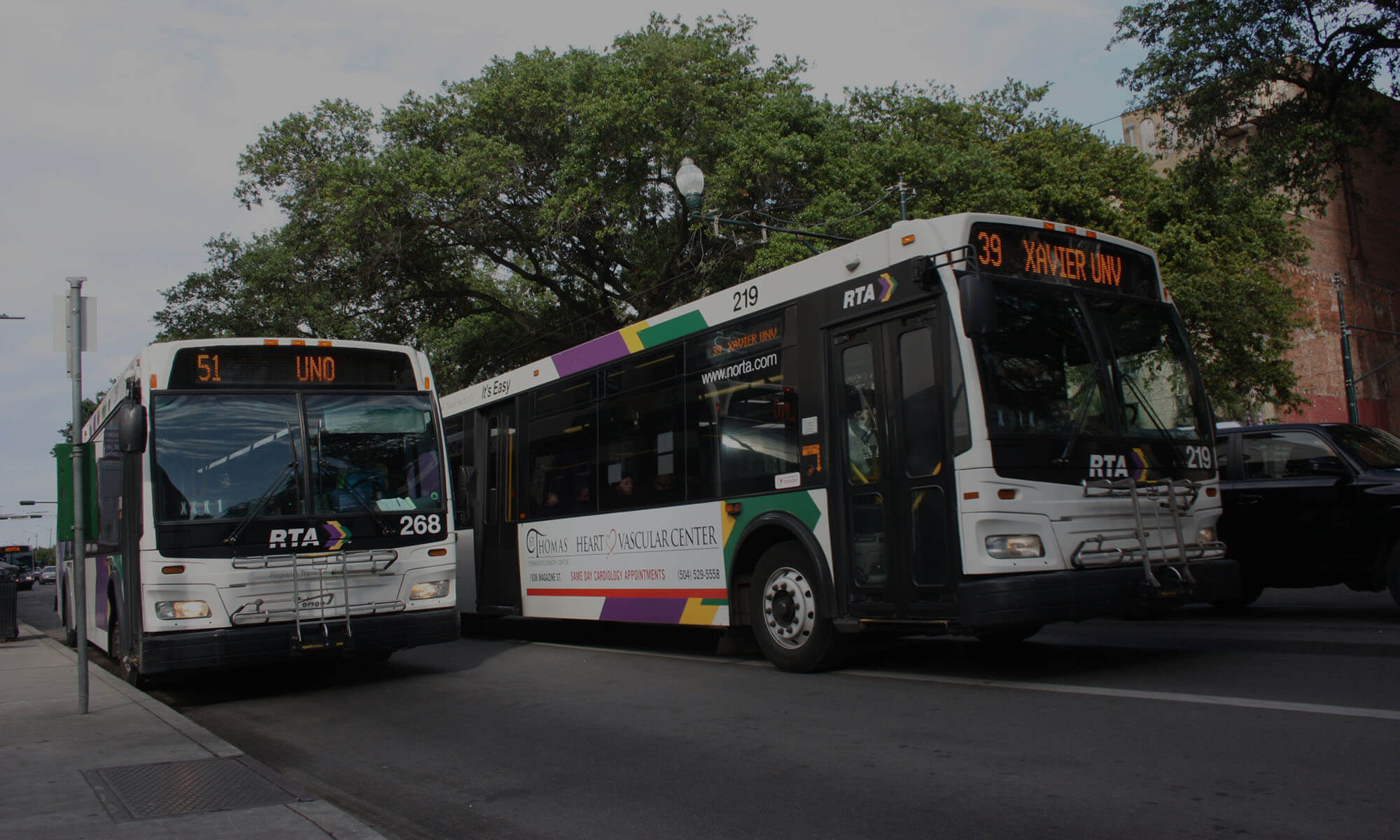Starting Sunday, March 29, a number of the New Orleans Regional Transit Authority’s (RTA) low ridership routes will be temporarily eliminated and the remaining routes will operate on a Saturday schedule.
You can see the full list on the RTA website.
The RTA says the goal is to maintain as much coverage as possible and provide each neighborhood at least some access to critical services.
While we were disappointed that the RTA made this decision without the community consultation that we feel was promised at last week’s RTA board meeting, we do understand the RTA’s basic problem. New Orleans is among the hardest hit areas in the country by the COVID-19 emergency, and more and more drivers are sick or at risk of getting sick. The RTA is rapidly approaching a point where there may not be enough available drivers to operate normal service.
We aren’t happy about these service cuts, but we think they are unfortunately necessary to ensure that some level of service can continue during the course of this emergency.
We do have concerns about overcrowding, though, as well as the temporary elimination of some normally high ridership routes. It’s critical that riders who have to take transit during this emergency get the best possible service with the lowest possible risk to their health.
We spoke with RTA staff this weekend to push on these key issues. We wanted to share the answers with you this morning as the service reductions begin to take effect:
1. Overcrowding is a major health risk right now. How will the RTA prevent it?
- RIDE asked the RTA to maintain regular weekday service on the #39 Tulane, #94 Broad, and #114 General De Gaulle to prevent overcrowding on lines we think will still have relatively high ridership. While we did not secure that, we did get the following assurances:
- The RTA will deploy their largest buses – the articulated, or “bendy” buses – on the three routes they think will be the busiest. The #62 Morrison and #94 Broad lines will have four articulated buses and the #39 Tulane will have two. There will be one remaining articulated bus held in reserve in case any break down.
- The RTA will have a number of operators and vehicles on “stand by” and will immediately dispatch one of those vehicles if there are more than 18 people on any bus. 18 is the number that the RTA considers the limit to ensure “safe” rider distancing. The RTA says that automatic passenger counters on each bus and streetcar work well and staff will be able to monitor this in real-time. RIDE is worried that this level of communication between departments may be hard to do, considering some of the RTA’s past organizational challenges, but are hopeful that this will work.
- If particular lines are busy during specific times during the day, the RTA will add additional buses to that line during that time period on a regular basis.
2. Can we reduce the number of routes that are eliminated?
- RIDE asked the RTA to maintain some level of service on the #11 Magazine, one of the higher ridership routes in normal times. Unfortunately, RTA staff said that cut will stay for now. Their logic is that #11 ridership is down significantly during the COVID-19 emergency and that the #10 Tchoupitoulas serves both Children’s Hospital and three grocery stores – important destinations during this emergency. The RTA says that in trying to space out coverage across the City, hard decisions have to be made and that since service remains on Tchoupitoulas and St. Charles, the #11 Magazine was not as critical during the emergency. We will continue to monitor the effect of this cut on riders – if it effects you personally, please let us know.
- On the bright side, the #57 Franklin and #115 General De Gaulle buses – both of which had been considered for cuts, will maintain service – though at the reduced Saturday level. Keeping the #115 means more regular service on the General De Gaulle “trunk” line (where the #114 and #115 routes overlap) will still be a possibility for Algiers residents.
3. Will fares be eliminated?
- The act of paying the fare is unfortunately one of the points where drivers and passengers have the most risk of exposure during a transit trip. So we were pleased to hear that for the duration of this emergency, the RTA will suspend fare collection. Everyone will ride for free and one potential way for the virus to spread will be stopped.
As we said at the beginning of this email, we don’t like these service reductions, but do understand that some level of continued reductions are necessary for continued coverage during this emergency.
But we don’t think that means there can’t be adjustments in the weeks to come as we learn more about both the virus and transit rider needs during the emergency.
We’ll continue pushing the RTA to be open to changes as the facts and situation dictate. But to do that right we need to hear from you. If you are still taking transit on a regular basis during the COVID-19 emergency, please be in touch to let us know:
- How are the service reductions affecting you?
- Are you seeing dangerous crowding on buses?
- Is the RTA sending out reserve buses when they say they will?
- What else are you seeing?
You can email us directly or you can fill out our online survey.
Please stay safe and healthy – we look forward to seeing you again before too long.

